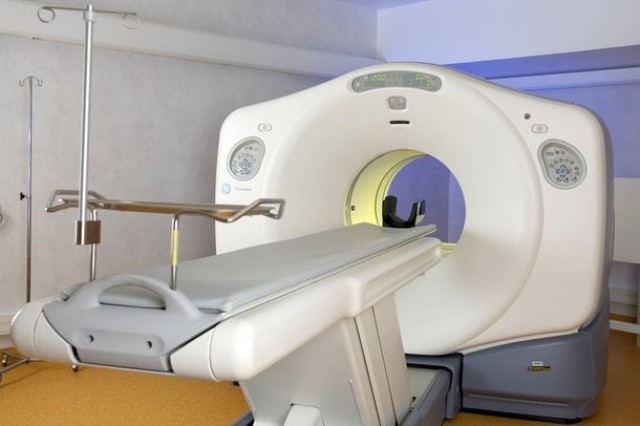Karachi’s 20m population has access to only four PET scanners
JPMC offers free of charge PET scans for cancer patients

There should be one pet scanner per every million people but Karachi only has four. PHOTO: NHS.UK
The X-ray was invented around 120 years ago and is one of the most significant inventions in the medical world. International Radiology Day is observed to mark the invention of the X-ray by Wilhelm Conrad Roentgen in 1895. This year, the day's theme was 'Emerging Radiology'. It was based on new ideas that have evolved in the field of radiology.
The invention of the positron emission tomography (PET) was a major advancement but these scan machines are almost non-existent in Pakistan. These are advanced machines that use nuclear imaging to create detailed, computerised pictures of organs and tissues inside the body. Cancer can easily be detected by the use of PET scan machines but they are not easily available in the country.
Medicine supply at Civil hospital comes to a halt
Jinnah Postgraduate Medical Centre’s (JPMC) Head of Radiology Dr Tariq Mahmood, who is also president of the Pakistan Body Imaging Radiology Society, said that one PET scan machine is needed for every one million people but in Karachi there are only four machines.
There should be at least 20 PET scan machines in Karachi.
There are no PET scan machines available in rural Sindh. In Punjab, there are two machines, while in Khyber-Pakhtunkhwa there is only one PET scan machine.
Dr Mahmood said there is a serious need for development in this field. He explained that the aim of observing International Radiology Day was not only to remember the novel invention, but also to identify the benefits and ways with which the invention made breakthroughs in the field of medicine.
The X-ray helps in diagnosis and its invention paved the way for further development in the field of radiology.
FIR of medicines' destruction in fire registered on SHC orders
Be it angiography, mammography, fluoroscopy, cardiology or neurology, all these fields are linked to radiology. Dr Mahmood, who is also a member of the Pakistan Nuclear Regulatory Authority, said that there is need of further advancement in the field of radiology. He said that we need more PET scan machines for the diagnosis of fatal diseases like cancer.
According to him, JPMC is the only hospital in Pakistan at which 15 patients are PET scanned every day. The hospital offers patients this facility free of cost. There are 40 government employees at JPMC’s radiology department and the Patient Care Foundation and Sindh government jointly function in the department.
Dr Mahmood said that every day 300 CT scans and 600 X-rays are done at JPMC free of charge. “Every patient is important to us, irrespective of their backgrounds; hence the Sindh government and Jinnah hospital are functioning well through public-private partnerships,” he said. “The [radiology] machines and their expenses can't be managed by the government; hence there is always a need of private institutions,” he explained. The doctor said that Scandinavian countries and Canada, where healthcare is free for citizens, also have the support of private institutions.
9,000 to get free medicines free of cost
Kiran Hospital in Karachi is also being run under government supervision and numerous cancer patients are treated there via radiation therapy.
CyberKnife, a technology similar to PET scans, is also playing its role at Jinnah hospital. Through it, the diagnosis of cancer, otherwise costing millions, is done free for patients. Cyberknife technology is regarded as one of most advanced non-invasive treatments of cancerous and non-cancerous tumors in the world. In normal circumstances, patients suffering from cancer spend between Rs15 million to Rs25 million on treatment. But patients using CyberKnife technology at JPMC receive free of charge treatments from diagnosis to final treatment. Patients requiring the use of radiology are often sent to Kiran Hospital. However, there is still a need of resources to treat cancer on a larger scale.



















COMMENTS (3)
Comments are moderated and generally will be posted if they are on-topic and not abusive.
For more information, please see our Comments FAQ